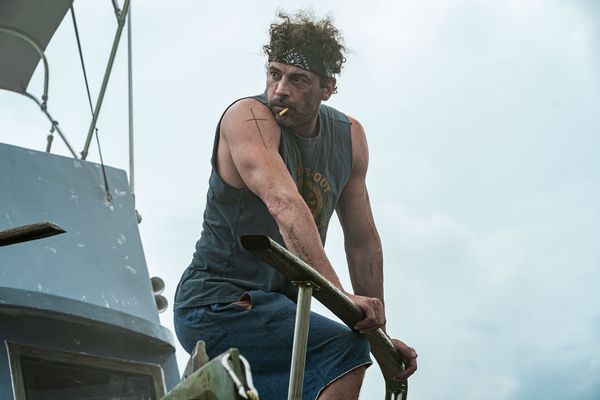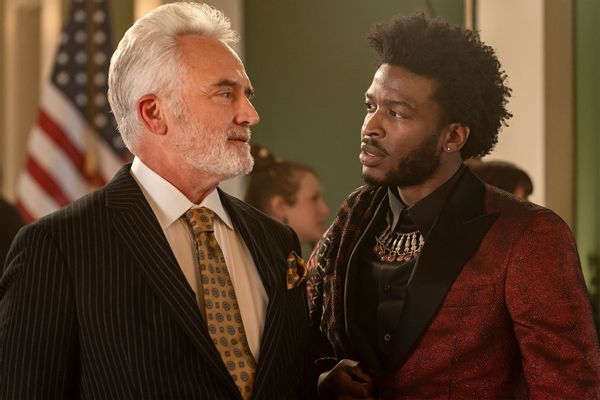
The shadow cast by “Breaking Bad” is inky, far-reaching and difficult, but not impossible, to escape. A few of “Parish” lead Giancarlo Esposito’s co-stars have tried with varying degrees of success. Bryan Cranston’s movie career avails him of some variety, but on Showtime’s “Your Honor” he plays another version of a good man pushed to commit evil for the sake of protecting his family.
Bob Odenkirk and Aaron Paul steered out of the derivative prestige trap to some degree, with Paul showing entirely different sides on “Westworld” and “BoJack Horseman,” and Odenkirk blending his comedy chops with his dramatic range on “Lucky Hank,” one of those fine shows we wish we’d kept watching.
Esposito, though, contends with a separate problem from his co-stars in that his singularly brilliant Gus Fring spans two shows, “Breaking Bad” and “Better Call Saul,” and created a mold from which he's still freeing himself.
Fring is a dapper, eternally composed villain possessed of a calm that drapes an outer layer of sinister over a performance that screams warnings without saying much at all. Gus speaks with a suave efficiency that lends an elegance to his villainy. That was also true of Moff Gideon in “The Mandalorian” as Stanley Johnston – “with a T!” – the wealthy American wolf hunting crooked aristocrats in Guy Ritchie's London, as seen in "The Gentlemen."
All of these are co-starring roles, each further cementing Esposito’s reputation of being the best reason to watch anything he’s in regardless of quality.
“Parish” is no different, and entirely too much like many dramas gunning to earn the “premium TV” label by emulating other critically acclaimed shows.
Like “Your Honor" it is an American adaptation of a foreign format — in this case a British show called "The Driver." The main distinction is that Esposito is the lead as opposed to the sideman, a designation that he should have received much earlier in his career. His command of Gracián Parish’s stony resolve behind the wheel is captivating in the opening episode when he glides through a dangerous chase through New Orleans with ease, improvising at turn after turn to escape the cops, refusing to lose his cool.
Gray, as he’s known, thought he’d left all that behind. (Yep, it’s one of those.) The former wheelman retired 18 years ago to run a luxury car service in New Orleans. But business has dried up, and he’s struggling to pay his mortgage.

So when his old partner in crime Colin (a very sweaty and bestubbled Skeet Ulrich) resurfaces with a frantic request to help him with a mess he’s slipped into with a Zimbabwean crime family, Gray steps up with the standard “OK, but just this once” agreement, which will surely be true this time!
Colin has run afoul of the Tongais, a family of human traffickers headed in the city by The Horse (Zackary Momoh), whose sister Shamiso (Bonnie Mbuli) counsels him as his capricious brother Zenzo (Ivan Mbakop) tries his patience, are establishing themselves in local business and politics as they exploit workers they lure to the states with promises of helping them gain citizenship.
In Gray, Horse sees an experienced, even-keeled potential ally who’s also exploitable; Shamiso does some digging and finds out he’s mourning the killing of his teenage son on top of the money problems. This leads to the good old "offer Gray can’t refuse" coupled with his confidence in knowing he’s the only man who can do what they require – you know, a specific set of skills, and so on, and so forth.
Competent copycat dramas abound these days, making this show’s place on the lower side of the quality scale’s midrange fairly typical. Esposito puts in maximum effort, muscling out a performance that exhibits his full range of dramatic capability despite prosaic scripts stringing together phrases you’ve heard in other shows and movies, and not necessarily superior ones.
Still, he warms substantially in scenes where he transitions from all business into a father and husband struggling to anchor his relationships with his daughter Makayla (Arica Himmel), who’s still navigating her grief over losing her brother, and his equally bereft wife Rose (Paula Malcolmson). They’re ready to leave the city for a fresh start, and with the bills piling up, cashing in what chips they still have makes sense.
The writers very quickly bump Gray’s family life from the shotgun seat to the back until we nearly forget they’re around. That’s a shame for a performer of Malcolmson’s caliber.
Like most of the other cast, she makes what we can of her screen time. Mbuli and Momoh similarly make watching worthwhile – Mbuli especially, both for her evil queen regalness and Shamiso’s enviable wardrobe. The Tongais are if nothing else models of aspirational style, which is the least a show like this can contribute to our weekly conversations.

They both draw and seize our attention alongside Esposito. That’s still a poor excuse for failing to develop other characters, including Amanda Brugel’s Sister Anne whose role amounts to little more than an expositional prop, and Bradley Whitford’s businessman, mainly there to add some local color to all the corruption.
For the viewer, though, the real shortcoming is the plot’s inconsistent pacing. Despite the standard body disposal and accompanying sidekick freakout, and a side journey designed to crack the hero’s mask of assuredness, the first two episodes set a speed that the middle hours downshift to the show's detriment.
This is one example of the drama's divided depiction of New Orleans. On the one hand, there's the cosmopolitan view of the Tongais, whose culture is one not often featured on TV. But then you have Gray stumbling through a random carnival parade, as if to play to the tourist stereotype. We should consider ourselves lucky that the appropriated accents aren't dripping with Northern gumbo, i.e. the kind that punishes us instead of lending flavor.
The fifth episode returns to form but if the sagging energy leads you to bow out before then you can’t be blamed for that. I suppose the fault lies instead with series co-creators Sunu Gonera and Danny Brocklehurst, who helmed the first two episodes before Gonera was swiftly excised from the production related to a sexual assault allegation.
That would cast a cloud over any series, but it’s especially unfortunate that it happened on one announcing Esposito as a worthy lead. Who can say whether that added an unwelcome drag to the season’s narrative cohesion? We can only judge what’s shown onscreen.
The six episodes allotted to “Parish” require a narrative discipline that simply isn’t in play, and Esposito’s talent demands original writing that rarely presents itself here. He’s excellent despite this lack – so much that it makes you want better for him. Maybe “Parish” will lead to more worthy projects, if not a second season that, fate willing, smooths out the rough patches and holes in its opening length of track.
"Parish" premiere at 10:15 p.m. Sunday, March 31. New episodes air at 9 p.m. Sundays starting on April 7.







